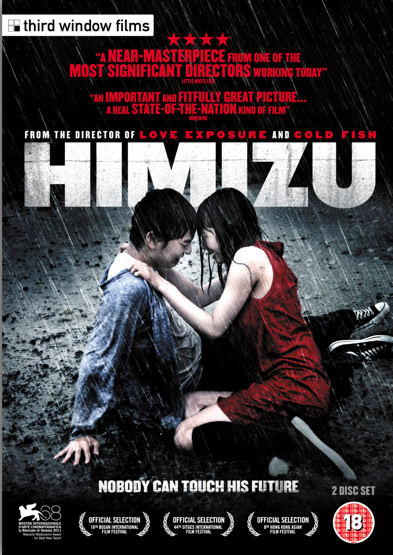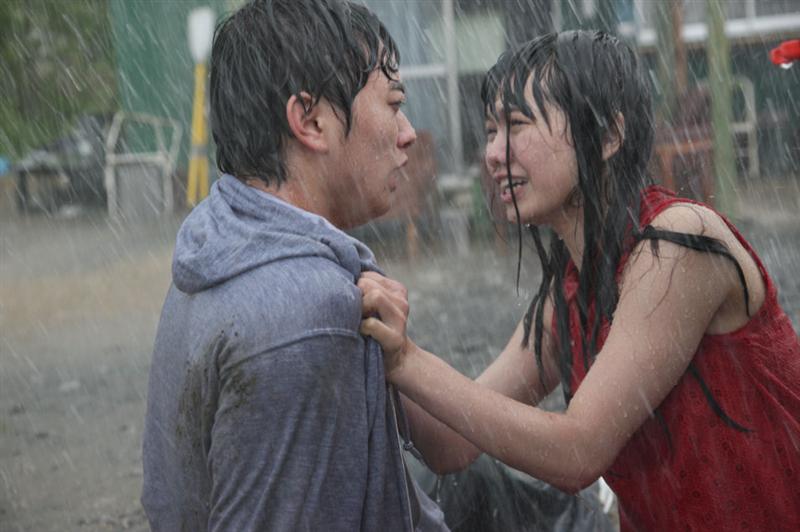Himizu (2011)

In the aftermath of the Fukushima disaster, a small community are struggling to come to terms with a world gone mad. 14 year old Sumida wants nothing more than to live a quiet, normal life - as invisible and unobtrusive as a mole (Himizu), but circumstances do not seem to be conspiring in this direction. Sumida's family would be trouble enough even without the turmoil of Fukushima, with his violent alcoholic father only appearing when he needs money or a victim, and his prostitute mother equally delinquent in her duty of care.
Classmate Keiko believes that Sumida cannot be an ordinary, insignificant person - she believes he is more than that. Indeed, she believes in him absolutely - a self-confessed stalker who collects his words to wallpaper her room, and resolves to help him make more of his life despite a palpable lack of desire for that help. Her irrepressible enthusiasm also masks a troubled soul and a turbulent home life, though.
HIMIZU is a film about damaged people in a difficult world trying to hold it together, to stand true to their vision of the person they want to be and the life they want to lead in the face of seemingly overwhelming adversity. Sion Sono does not give his characters much of a chance - subtlety is not one of his strongest suits, and the environment he plunges Sumida and Keiko into is a nightmarish world in which the devastation of Fukushima seems like the least of their concerns. Indeed, the Fukushima aspect was largely an afterthought - the film was written and ready to roll cameras when the earthquake and tsunami struck in 2011, and Sono quickly adapted the script and sent out his film crew to capture footage of the aftermath as it seemed suitably symbolic of the characters' home lives.
The harshness of the teenagers' world, particularly their parental relationships, goes far beyond what could be considered "bad" into territory that must be viewed as surreal, in the belief or hope that no parents could say or do the things that the characters in HIMIZU do. The temptation to retreat into fantasy is continuous, with Keiko more actively willing to do so than Sumida, who is less able to escape the nightmarish through denial. Keiko has a vision of a happy family life with herself as the ever-supportive wife her own family lacks, whilst Sumida aspires only to a life that is "neither happy or unhappy" and hopes only that he can maintain his own integrity and not become the kind of monster that his father is.
As their tragically unambitious dreams seem to slip ever further out of their grasp, the characters begin to break down, losing their grasp on that core of self-identity which they are desperate to protect, until eventually they come to realise that together they are marginally stronger and more resilient than they would be alone.

The themes of HIMIZU are widespread in Japanese cinema - a vision of a society that seems hell bent on crushing its youngest and most vulnerable members, and a deriliction of the parental duty to shepherd them through these difficult times. Most cinema world-wide does seem targeted more at the younger generation, and HIMIZU did remind me that I'm getting old as I am too far removed from Sumida and Keiko's generation to fully identify with their plight. Few people's teenage years can be quite as terrible an ordeal as theirs though, I suspect, though they probably seem like it at the time.
HIMIZU is in some ways a difficult film to review - the exaggeration of aspects of the tale makes it hard to take seriously, but then there is a core of raw honesty and insight that tethers it even in the most implausible sections. Credit for this must be given to the young actors who play Sumida and Keiko - the only characters in the film who do maintain a semblance of realism, rather than one-dimensional comic-book cutouts, even as they descend into madness.
Fumi Nikaido delivers a particularly heroic performance, projecting a heart of eternal optimism and that cuteness that only Japanese girls seem truly able to achieve, but which occasionally breaks down and reveals the core of horror and despair she is trying to shield herself from. Shota Sometani's character is more stoic for the most part, but struggling to suppress the legacy of violence and hate which his father has given him as a birthright.
HIMIZU shares quite a few elements with Sono's epic Love Exposure, but only devotes a much shorter running time to expanding them, leaving behind some of the moments of tangential whimsy and fantasy as a result, leaving a more raw film without the moments of balancing uplift that LOVE EXPOSURE weaves around its characters' fundamental tragedy - the respites from their nightmare are even more occasional and brief. The result is that the film is less powerful, and the slim hope offered by the entreaty to "never give up" is less convincing.
Sion Sono does not seem to have much faith in Japanese society as a whole, and the temptation to read HIMIZU as a message to the nation post-Fukushima that they can endure adversity as long as they keep their core of self-identity and self-belief intact should probably be dismissed. Like Battle Royale, it should probably be read more as message to the younger generation not to have faith in their seniors, but to be ever on their guard and ready to RUN.
Crew
| Director | |
|---|---|
| Writer |





